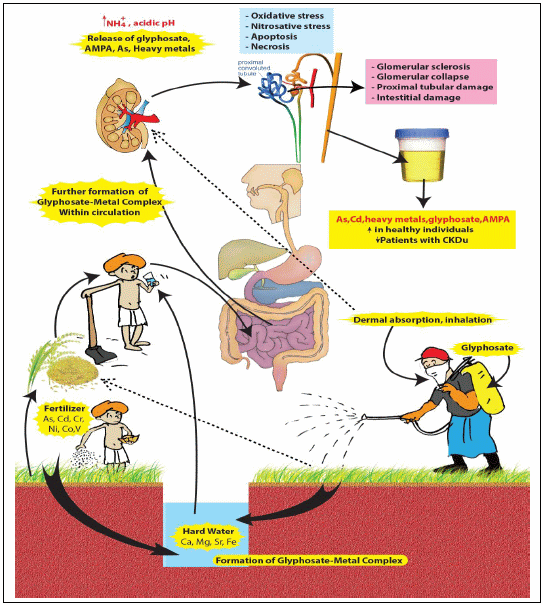"They propose glyphosate becomes extremely toxic to the kidney when it mixes with 'hard' water or heavy metals like arsenic ..."
My yard has 2-4xs "safe" level arsenic and dioxin, and RoundUp was applied...I got very sick...
My yard has 2-4xs "safe" level arsenic and dioxin, and RoundUp was applied...I got very sick...
A new study published in the International Journal of Environmental Research and Public Healthproposes a link between the herbicide known as Roundup (aka glyphosate) and a series of mysterious epidemics of fatal chronic kidney disease of unknown origin (CKDu) affecting several poor farming regions around the world.
The extent of the health problem is so massive that the Center for Public Integrity found that CKDu has killed more people in El Salvador and Nicaragua than diabetes, AIDS and leukemia combined, over the past 5 years on record.
Titled, "Glyphosate, Hard Water and Nephrotoxic Metals: Are They the Culprits Behind the Epidemic of Chronic Kidney Disease of Unknown Etiology in Sri Lanka?" researchers hypothesized that while glyphosate is toxic, it alone is not capable of destroying kidney tissue on the scale recently observed in rice paddy regions of Northern Sri Lanka, or in El Salvador where it is the second leading cause of death among men. They propose glyphosate becomes extremely toxic to the kidney when it mixes with 'hard' water or heavy metals like arsenic and cadmium, either naturally present in the soil or added externally through fertilizer inputs. Hard water contains 'metals,' such as calcium, magnesium, strontium and iron, along with carbonate, bicarbonate, sulphate and chlorides.
Posted on:
Tuesday, February 25th 2014 at 8:45 pm
Written By:
Sayer Ji, Founder GreenMedInfoChronic kidney disease - news and investigations
Abstract: The current chronic kidney disease epidemic, the major health issue in the rice paddy farming areas in Sri Lanka has been the subject of many scientific and political debates over the last decade. Although there is no agreement among scientists about the etiology of the disease, a majority of them has concluded that this is a toxic nephropathy. None of the hypotheses put forward so far could explain coherently the totality of clinical, biochemical, histopathological findings, and the unique geographical distribution of the disease and its appearance in the mid-1990s. A strong association between the consumption of hard water and the occurrence of this special kidney disease has been observed, but the relationship has not been explained consistently. Here, we have hypothesized the association of using glyphosate, the most widely used herbicide in the disease endemic area and its unique metal chelating properties. The possible role played by glyphosate-metal complexes in this epidemic has not been given any serious consideration by investigators for the last two decades. Furthermore, it may explain similar kidney disease epidemics observed in Andra Pradesh (India) and Central America. Although glyphosate alone does not cause an epidemic of chronic kidney disease, it seems to have acquired the ability to destroy the renal tissues of thousands of farmers when it forms complexes with a localized geo environmental factor (hardness) and nephrotoxic metals.
Keywords: chronic kidney disease of unknown etiology; glyphosate; hard water; nephrotoxic metals; arsenic

No comments:
Post a Comment